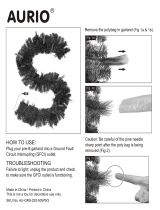
Part # 4530868 (04/25/12)Page 8
INSTALLATION Continued
and strain relief, and connected to the appropriate power
supply by a certied electrician in accordance with local
codes.
Gas Connection
ENSURE THE GAS METER AND GAS PIPING ARE SIZED
CORRECTLY FOR THE AMOUNT OF GAS FLOW AND PRESSURE
THAT WILL BE NEEDED TO RUN ALL APPLIANCES IN THE
KITCHEN. UNDERSIZED GAS PIPING INTO THE KITCHEN
MAY AFFECT THE PERFORMANCE OF THIS AND/OR OTHER
EQUIPMENT. IF IN DOUBT, CONSULT YOUR LOCAL GAS
AUTHORITY.
A MANUAL OR AUTOMATIC ISOLATION VALVE MUST BE
INSTALLED ON THE GAS SUPPLY TO THE KITCHEN FOR
ACCESS IN THE EVENT OF AN EMERGENCY. THE MANUAL
VALVE OR AUTOMATIC VALVE ACCESS POINT SHOULD BE
READILY ACCESSIBLE AND LOCATED EITHER OUTSIDE THE
KITCHEN OR CLOSE TO AN EXIT. POST THE FOLLOWING
NOTICE AT THE MANUAL VALVE OR AUTOMATIC VALVE
ACCESS POINT:
“ALL DOWNSTREAM BURNER AND PILOT VALVES MUST
BE TURNED OFF PRIOR TO RESTORING THE GAS SUPPLY.
AFTER AN EXTENDED SHUT OFF, PURGE BEFORE
RESTORING GAS.”
1. A manual gas shut-o valve must be installed in the gas
supply line ahead of the appliance for safety and ease
of future service. The shut-o valve should be located
such that it can be reached quickly in the event of an
emergency. The shut-o valve is normally supplied by the
installer.
2. This unit is shipped with a gas pressure regulator. It must
be installed at the appliance prior to connecting the
equipment to the gas line. Each appliance must have its
own pressure regulator. Be sure to install the regulator
according to the gas ow direction and verify that the
pressure marking corresponds with the gas type. Failure
to install a regulator will void the equipment warranty.
PRIOR TO CONNECTING THE REGULATOR, CHECK THE GAS
SUPPLY LINE PRESSURE. THE REGULATOR SUPPLIED WITH
THE UNIT IS RATED FOR A MAXIMUM OF ½ PSI (14” WC). IF
THE GAS SUPPLY LINE PRESSURE EXCEEDS THIS MAXIMUM,
A STEP DOWN REGULATOR WILL BE REQUIRED AND MUST BE
INSTALLED IN ACCORDANCE WITH LOCAL CODES.
THE RED AIR-VENT CAP IS PART OF THE REGULATOR AND
SHOULD NOT BE REMOVED, UNLESS LOCAL CODES REQUIRE
EXTERNAL VENTING. IF EXTERNAL VENTING IS REQUIRED,
INSTALL IN ACCORDANCE WITH LOCAL CODES.
3. A certied exible gas hose and quick disconnect
assembly with suitable strain relief is recommended for
connection from the gas supply line to the unit. This will
allow the unit to be moved for future service.
FLEXIBLE HOSES & QUICK DISCONNECT DEVICES MUST
COMPLY WITH ALL LOCAL AUTHORITIES AND CODES.
IN NORTH AMERICA THIS INCLUDES ANSI Z21.69/CSA
6.16, ADDENDA Z21.69B-2006/CSA 6.16B-2006 (OR
LATEST EDITION) AND ANSI Z21.41/CSA 6.9, ADDENDA
Z21.41A-2005/CSA 6.16A-2005 (OR LATEST EDITION).
4. Only connect this unit to the type of gas shown on the
rating plate. Operating this unit with the wrong gas type
can result in abnormal performance, property damage,
injury or death.
5. Ensure that any new piping, joints and connections have
been made in a clean manner, so that dirt, threading
chips and/or other foreign matter will not clog pilots,
valves and/or controls. If necessary, purge new piping
prior to connecting the appliance. Use pipe sealant that
is certied for use with liqueed petroleum, for new joints
and/or connections, where sealant is required.
6. When pressure testing the gas supply piping to a
maximum of ½ psi (14” WC, 3.45 KPa), the appliance must
be isolated from the supply line by closing the manual
shut-o valve.
7. To ensure optimal operation of this unit, it is
recommended that the dynamic gas supply pressure into
the appliance regulator is a minimum of 1” WC higher than
the pressure stated on the rating plate.
Start Up
1. Inside the unit, ensure the burners are in the correct
position and the shields hanging under the burners have
not rotated out of position during transit.
2. Install cast radiants over each burner and place the
cooking grates in position on the unit.
3. Ensure the gas supply to the appliance is open and the
unit is connected to the power supply. Activating the one
or two power switches on the right leg operates the unit.
4. Check all gas connections for leaks using a soap solution.
Do not use an open ame to check for leaks. Be sure to
inspect connections outside and inside the unit (ie: valves,
manifold ttings and connections in the left leg channel)
to make certain all connections are gas tight after
shipping.
5. Verify the unit is running at the pressure stated on the
rating plate as follows:




















